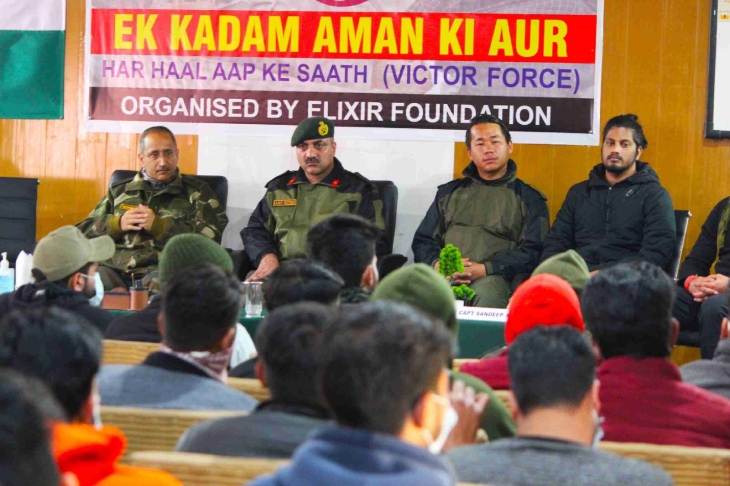
By Aijaz Ahmad Turrey
Mission Pehal – A Youth Interaction Programme, held by the Victor Force (Indian Army) and organised by Elixir Foundation (A Gujarat Based NGO) on 21 February, 2021 in South Kashmir’s Pulwama district, is one of the rare dialogues that took place between the Indian Army and Kashmiri youth at Town Hall Pulwama. The programme is first of its kind that involved active and open participation of the local youth, initiating an important step towards peace and tranquillity in Kashmir. The Chief guest for the event was General Officer Commanding (GOC) Victor Force, Major General Rashim Bali, who was accompanied by 12 Sector Brigadier Ajay Katoch and Colonel AT Sebastian of 55 RR and other officers. They responded to questions of the local youth. The programme allowed the Kashmiri youth to talk about everything as it intended to remove the communication gap and fear by building confidence.
Several important questions related to the current situation in Kashmir Valley were raised by the youth. The GOC assured them that they would do their best to consider their demands and told the accompanying officers to expedite the legitimate demands of the youth, so that a positive atmosphere could be created between the army and youth. One of the important questions asked was to prohibit the use of ‘Human Shield’ during encounters and search operations. It is a common practice in South Kashmir to use youth by security forces as shields during such operations, especially sending them inside houses where militants are believed to be trapped. There is always a fear of getting killed if any party opens fire. Similarly, questioned were raised as to why families and localities were targeted when any youth picks up arms and joins militancy. Since families always try to teach good manners to their children, they cannot be held responsible for their errant children. The major problems faced by family and relatives of the militants include unnecessary visits to and from police stations and security personnel, less job preference, suspension of passports, routine investigations, etc. Replying to the human shield question, the GOC said that it is used as a cover so that no one could level charges against the military. If the military personnel go inside the house unaccompanied, they are often accused of stealing stuff and misbehaving with the women.
In a historic judgement, the Supreme Court of India pronounced that the right to privacy is a fundamental right (Articles 14, 19 and 21) but is violated on a daily basis. A youth asked why the security personnel snatch their mobile phones and keep with them for days on the pretence of searching them. This usually happens during search operations when the mobile phones are taken away from youth who is suspected to be engaging in anti-national activities. To this, the Major General ordered that no one’s mobile phone would be retained for more than 20 minutes. Many suspects are even picked up and kept in jail for days without a charge sheet. In some cases, they languish in jail for years while their families are forced to beg and incur debt from neighbours. When the suspects are finally acquitted, no compensation is provided to them; instead, they remain under the radar. The Major General said that arresting people on different charges falls under the jurisdiction of the police to avoid law and order issues. While many young security personnel grow long hair to look smart, the same is not allowed for the local youth as they are beaten for having long hair. A youth said to the General that this created fear among locals.
Some other questions were raised by the youth during the dialogue: Why do thousands of troops come during encounters to kill militants? Why is the civilian traffic movement stopped during the convoy movement? Why are heightened speed breakers installed near the army camps? The Major General assured them that this was for the safety and security of the civilians. Since a militant is difficult to identify and can throw a grenade and run away, this was meant to minimize the collateral damage. He also assured them that the speed breakers would be removed from several places to ease movement. The Major also focussed on the online recruitments to engage youth as Over Ground Workers (OGWs) not only from Kashmir but also from other parts of the country.
A crucial question was raised during the interaction: Why is the house in which militants are trapped destroyed by the military personnel? People have no control over militants hiding in their houses. While they are afraid, they cannot stop the militants. As one youth rightly pointed out, if people fear the army with the gun, they have every reason to fear an armed militant, allowing them unwillingly inside their houses. But the security forces often destroy such houses overlooking the hard-earned money spent on constructing a house. No compensation is provided to such households; instead, people are threatened not to provide support to such families. If it is war then it should be between the security forces and militants, and not involve the Kashmiris, said one youth.
Overall, the interaction under ‘Mission Pehal’ was an informative dialogue towards a peaceful Kashmir. The Major General advised the youth that security and development are interrelated for the betterment of the society. When everyone feels free and mentally secure, development can be initiated. He further said that the youth should refrain from taking decisions in the heat of excitement. They should consider both sides and not take biased decisions and engage in conspiracy theories. Major General Rashim Bali further said that conducting such programmes would diminish the gap and build greater communication between the security forces and the young people of the Valley, leading to harmony, prosperity, and progress.
Bio:
Dr. Aijaz Ahmad Turrey is an Academic Associate at the Indian Institute of Management Ahmedabad.
***
Like Cafe Dissensus on Facebook. Follow Cafe Dissensus on Twitter.
Cafe Dissensus Everyday is the blog of Cafe Dissensus magazine, born in New York City and currently based in India. All materials on the site are protected under Creative Commons License.
***
Read the latest issue of Cafe Dissensus Magazine, “Pandemics/Epidemics and Literature”, edited by Nishi Pulugurtha, Kolkata, India.
